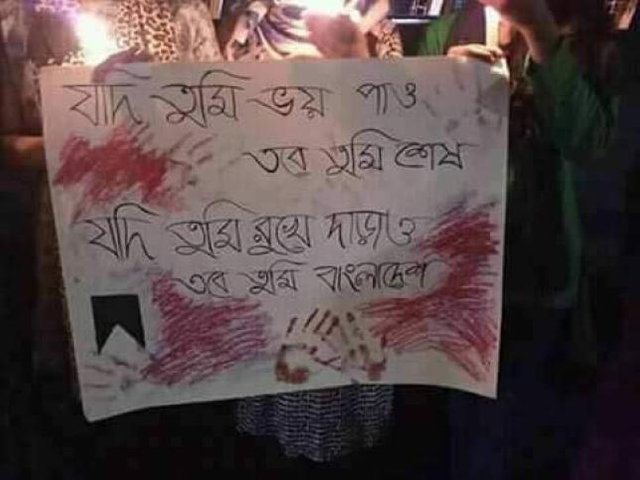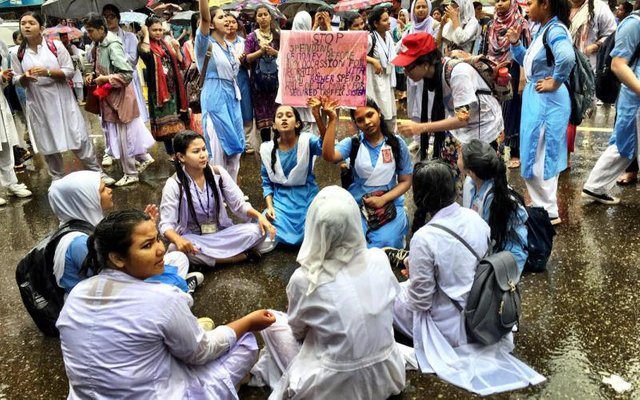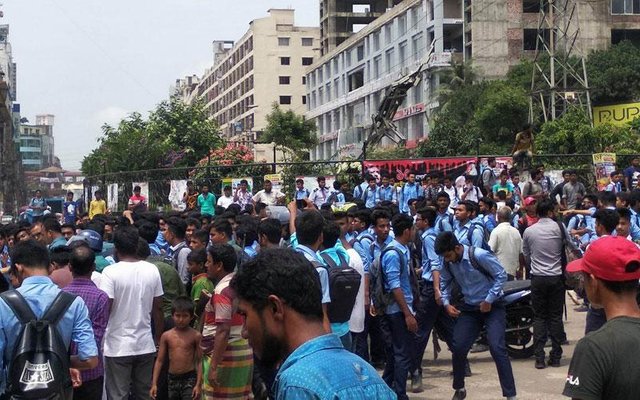If you do something wrong with the students, they can change the environment.They just want's there justice.
.jpg)
A student protester holding a placard that reads If you fear, you are finished; If you resist, it’s all about Bangladesh during a demonstration recently in Dhaka city. Photo: Collected
When the people of a generation do what they didn’t know how to do, what will we say immediately? Teenagers in school uniforms, checking driving licences, this is what we have witnessed in Dhaka of 2018.
Like a scene from a children’s movie? It is being watched by all those whose conventional thinking failed to measure the power of complete innocence.
Let’s not blame the government alone for the current situation: Why didn’t the dissenting or conscientious voices protest at the series of misdeeds, scams and corrupt practices that have taken roots in society in quite a long time?
The teens’ is only one of many protests the Bangladesh society should have seen. However, theirs is not a very complex one the way it flared up, although some may smell rat and others may really try to use or misuse it.
The students first reacted to the death, or perhaps the killing, of two innocents caused by a bus. They were then angered by the comments of the shipping minister who was prone to criticise the reactions to road crashes, but not the crashes.
As the students took to the streets, the law enforcers took the historic recourse of beating protesters. As the photograph showing a policeman grabbing collar of a boy and another cop beating a girl went viral, the students’ demonstration spilt over the capital city of Dhaka.
Engagement of the juveniles in the protests is the newness, which some call Shishu Bidroho (Children Revolt) or Shishu Biplob (Children Revolution), a topic to be studied in future.
“If you fear, you are finished; If you resist, it’s all about Bangladesh,” one of the slogans used by the demonstrators read as they had spread over Dhaka streets in an atmosphere of shrinking space for protest and criticism.
Critics, however, tend to suggest with idealistic tone that the ‘juveniles’ should not have been on the streets, leaving their schools. Such opportunists fail to realise such tender-aged students would not have taken to the streets, had the senior ones played their due role.
The students also changed the gear of protests, primarily against the ills in transport sector. There is no clear demand for a set of conventional remedial measures and that’s why the government is struggling in finding any way out to assuage their wrath. Schools were declared closed after the fourth day of demonstration but the students again came in to protest in heavy numbers.

The rulers and the opposition alike thought the paths of movement that were common in this part of the world were all closed to nowhere but suddenly they experienced what they could not foresee.
Trying to do what they are not supposed to do is the most unique part of the demonstration - checking licence and documents of the motor vehicles and drivers.
They had just not rejected the system but also said they did not believe the pledges without actions. Their demand, if not articulated, is more than the trial of the driver responsible for death of two students or resignation of a minister who could afford to smile while talking about the tragedy.
Even one who knows nothing about Bangladesh would ask what hell has the state done over the years when all these irregularities piled up.
Even the police authorities, as media reports say, have asked the drivers of the vehicles that carry them to keep with them driving licences and other documents. The directive came only after some students stopped police vehicles running without documents. At least something is being done!
Why have all other actors - especially the civil society - remained so silent about the protests by the innocents?

“Most of them (Bangladeshi social researchers and the media analysts) are stuck to parochial cycle of conspiracy theory, the spirit and elections,” a Bangladeshi researcher staying abroad suggested in a Facebook post. He felt that today’s Bangladesh youth, especially the urban boys and girls, are angry with corruption, ill politics and shrinking space for the freedom of speech.
These youths have demanded justice - justice which cannot be established selectively. Do they not hope to get good jobs - in private and public sectors - or a secure society? They have not said either that they do not want to elect their leaders in free and fair elections.
There is a broader failure on different fronts - political, social and research - to understand the language, and prospects of the newer generations.